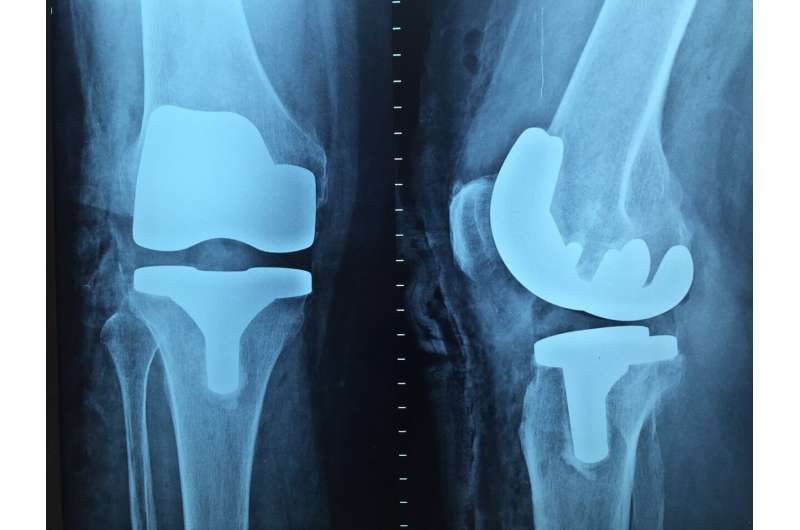This article has been reviewed according to Science X's editorial process and policies. Editors have highlighted the following attributes while ensuring the content's credibility:
fact-checked
trusted source
proofread
New guideline introduces recommendations for optimal timing of elective hip or knee arthroplasty

The American College of Rheumatology (ACR) and the American Association of Hip and Knee Surgeons (AAHKS) have released a summary of its new guideline titled "the Optimal Timing of Elective Hip or Knee Arthroplasty for Patients with Symptomatic Moderate to Severe Osteoarthritis or Osteonecrosis Who Have Failed Nonoperative Therapy."
The ACR and AAHKS have worked together before, creating guidelines for Perioperative Management of Antirheumatic Medication in Patients with Rheumatic Diseases Undergoing Elective Total Hip or Total Knee Arthroplasty in 2017 and 2022.
While those guidelines focus on which medications to take during and withhold prior to hip or knee arthroplasty for patients with rheumatic diseases such as systemic lupus erythematosus (SLE), spondyloarthritis (SpA), and rheumatoid arthritis (RA), this guideline focuses on the timing of hip and knee arthroplasty, and when additional nonoperative treatment or delays for medical optimization are appropriate for patients with advanced osteoarthritis and osteonecrosis who have failed nonoperative therapy.
"For patients with symptomatic moderate to severe osteoarthritis or osteonecrosis of the hip or knee who have been indicated for total hip or total knee arthroplasty, the efficacy of additional nonoperative treatments, such as physical therapy, anti-inflammatories, and injections is unknown," said Charles P. Hannon, MD, MBA, Assistant Professor of Orthopedic Surgery at Washington University in St. Louis and co-literature review leader of the guideline.
"In addition, for patients with certain risk factors, such as obesity, which are linked to increased risk and poorer outcomes, the benefit of delaying surgery to modify these risk factors is not well established. For these reasons, a guideline needed to be created."
All the recommendations in the guideline are conditional. While there are no strong recommendations, there was high consensus for all recommendations.
One key recommendation is that patients with moderate to severe symptomatic osteoarthritis or osteonecrosis who are indicated for joint replacement and have failed nonoperative therapy should proceed directly to surgery without delay for additional nonoperative treatment of the joint problem.
"There is no evidence that delaying surgery for any of the additional nonoperative treatments studied, including physical therapy, gait aids, oral anti-inflammatories, or injections, leads to improved outcomes, and may burden patients without clear benefit," said Susan M. Goodman, MD, attending rheumatologist at the Hospital for Special Surgery and co-principal investigator of the guideline.
Another key recommendation is that patients with nicotine dependence or diabetes should delay surgery to achieve either nicotine cessation or decreased use of nicotine products, as well as to allow for improved glycemic control.
"For patients presenting with nicotine dependence, there is a potential benefit of delaying total joint arthroplasty for nicotine use reduction or cessation," said Dr. Hannon. "The patient should be educated about the increased surgical risks associated with nicotine use and ideally engage in nicotine reduction strategies."
As with many ACR guidelines, a Patient Panel was consulted in the development of this guideline. The panel stressed the importance of shared decision-making between a patient and their physician when indicating a patient for total joint arthroplasty.
"This shared decision-making process should comprehensively discuss the unique risks and benefits of the procedure for the individual patient," said Dr. Goodman. "Patients with medical or surgical risk factors as described in this guideline should be counseled as to their increased risks, and preoperative attempts to modify these risk factors through efforts such as weight loss, glycemic control, or smoking cessation should be encouraged."
A full manuscript of the guideline has been submitted for journal peer review and is anticipated to be jointly published in ACR and AAHKS journals in 2023. The summary of the guideline recommendations can be viewed in full on the ACR and AAHKS websites.



















